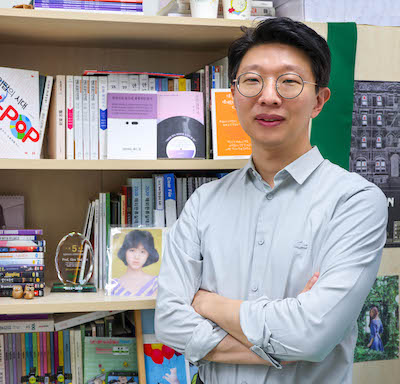Why have so many members of “Generation Z,” those born in the late 1990s and early 2000s, embraced K-pop? That is one of the questions George Mason University K-pop expert Gyu Tag Lee addresses in his new book, Z with Luv: Post-BTS and the Future of K-Pop. Z with Love is his third book on K-pop.

With his extensive expertise in K-pop, popular music, media studies, the Korean wave, and the globalization of culture, Lee has cemented his position as a renowned authority in these fields. He has been featured in numerous international media outlets and documentaries, such as Netflix's Explained and EBS's Class e lecture series. An associate professor of global affairs at Mason Korea, he also serves as a committee member of the Korean Music Awards.
In Z with Luv, Lee delves into Generation Z's fascination with K-pop, exploring its historical background, genre characteristics, and unique business model. He also investigates the reasons why K-pop has captivated not only young people in Korea, but all over the world. In the book, Lee also examines the global impact and historical significance of BTS's unparalleled success, forecasting the "4th generation" or the future of K-pop, often referred to as the "Post BTS" era.
Lee believes the Korean Wave, particularly the influence of K-pop and the Korean language boom, has played a pivotal role in attracting international students to Korea, including those at Mason Korea.
"For the new younger generation called ‘Zillennials,’ K-pop is not only their favorite music, but also an integral part of their culture, entertainment, identity, and a means of distinguishing themselves from other generations," Lee said.
Having taught at Mason Korea since its opening in 2014, Lee has witnessed the surge of international students on campus—nearly 10 times the number from Fall 2014 to Fall 2022—many of whom take his classes on K-pop and media studies.
“Nearly all international students who come to study at Mason Korea are fans of K-pop or other Hallyu content, such as K-dramas and K-variety shows,” said Lee. “When they fall in love with K-pop and other Hallyu content, they naturally become interested in other aspects of Korean culture, especially Korean language, food, traditional culture, and history. These interests lead them to Mason Korea—not only to take classes on campus, but also to explore and experience Korea firsthand.”
Lee also emphasizes the significance of the Korean language boom. “Knowing and using the Korean language has become a trendy and ‘cool’ phenomenon among some global Zillennials,” he said. “Knowing how to speak, read, and understand the Korean language can open doors to being on the cutting edge of fashion and trends,” he added.
Mason is one of the only universities in the mid-Atlantic region of the United States to offer a degree program in Korean studies. It makes perfect sense that Mason’s only global campus is strategically located in in Korea. As such, an increasing number of Korean majors from the Fairfax Campus are seizing the opportunity to study at Mason Korea. Through this immersive experience, students not only refine their Korean language skills, but also have the opportunity to work on campus, while immersing themselves in the Korean culture and lifestyle.
Lee has been engaging in speaking engagements to discuss his new book, including a panel discussion hosted by the Center for Hallyu Studies at Seoul National University. He plans to hold a book talk at Mason Korea in the coming fall to share his insights and discuss the evolving world of K-pop with the community.
